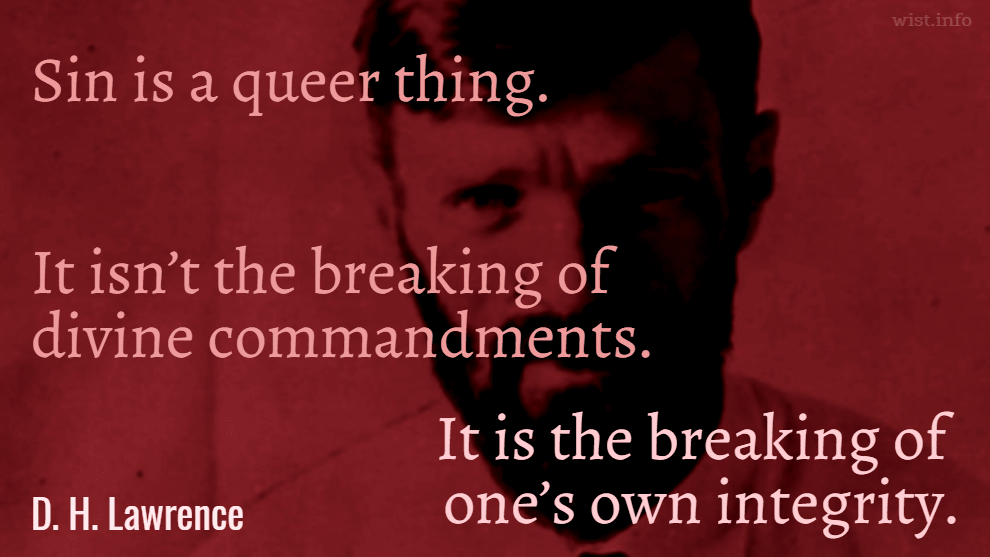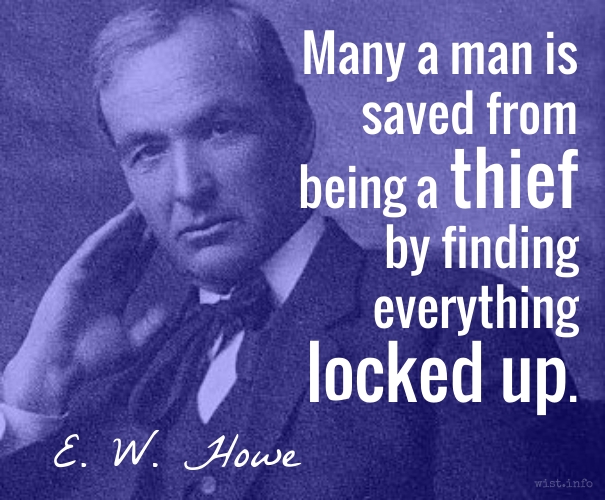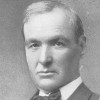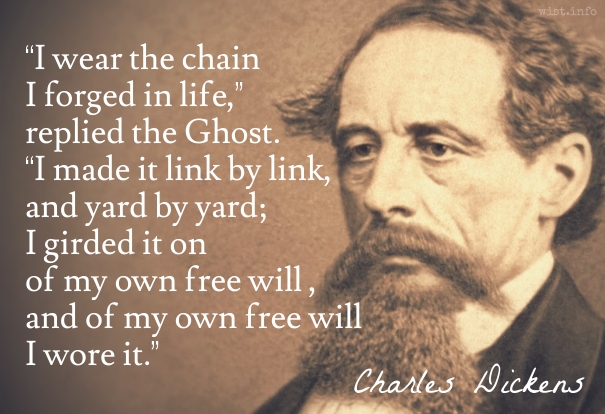Ambition hath one heel nailed in hell, though she stretch her finger to touch the heavens.
John Lyly (c. 1553-1606) was an English writer [also Lilly or Lylie]
Midas: A Comedy, Act 2, sc. 1 [Sophronia] (1592)
(Source)
Sometimes misquoted as "nailed in well." Sometimes misattributed to Lao-tzu.
Quotations about:
sin
Note not all quotations have been tagged, so Search may find additional quotes on this topic.
For my own part, I consider the best and most finished type of man to be the person who is always ready to make allowances for others, on the ground that never a day passes without his being in fault himself, yet who keeps as clear of faults as if he never pardoned them in others.
[Atque ego optimum et emendatissimum existimo, qui ceteris ita ignoscit, tamquam ipse cotidie peccet, ita peccatis abstinet tamquam nemini ignoscat.]
Pliny the Younger (c. 61-c. 113) Roman politician, writer [Gaius Plinius Caecilius Secundus]
Epistles [Epistulae], Book 8, Letter 22 “To Geminus” [tr. J.B.Firth (1900)]
(Source)
Alt. trans.: "The highest of characters, in my estimation, is his, who is as ready to pardon the moral errors of mankind, as if he were every day guilty of some himself; and at the same time as cautious of committing a fault as if he never forgave one."
If God didn’t want women to be looked at, he would have made ’em ugly — that’s reasonable, isn’t it? God isn’t a cheat; He set up the game Himself — He wouldn’t rig it so that the marks can’t win, like a flat joint wheel in a town with the fix on. He wouldn’t send anybody to Hell for losing in a crooked game.
Robert A. Heinlein (1907-1988) American writer
Stranger in a Strange Land, ch. 27 [Patty] (1961)
(Source)
‘Tis no Sin to be tempted, but to be overcome.
William Penn (1644-1718) English writer, philosopher, politician, statesman
Some Fruits of Solitude, #450 (1693)
(Source)
See Shakespeare.
Children will imitate their fathers in their vices, seldom in their repentance.
Charles Spurgeon (1834-1892) British Baptist preacher, author [Charles Haddon (C.H.) Spurgeon]
Spurgeon’s Sermons, 3rd Series, Sermon 21, “Manasseh” (1883)
(Source)
We begin to notice, besides our particular sinful acts, our sinfulness; begin to be alarmed not only about what we do, but about what we are. This may sound rather difficult, so I will try to make it clear from my own case. When I come to my evening prayers and try to reckon up the sins of the day, nine times out of ten the most obvious one is some sin against charity; I have sulked or snapped or sneered or snubbed or stormed. And the excuse that immediately springs to my mind is that the provocation was so sudden and unexpected; I was caught off my guard, I had not time to collect myself.
Now that may be an extenuating circumstance as regards those particular acts: they would obviously be worse if they had been deliberate and premeditated. On the other hand, surely what a man does when he is taken off his guard is the best evidence for what sort of a man he is? Surely what pops out before the man has time to put on a disguise is the truth? If there are rats in a cellar you are most likely to see them if you go in very suddenly. But the suddenness does not create the rats: it only prevents them from hiding. In the same way the suddenness of the provocation does not make me an ill-tempered man; it only shows me what an ill-tempered man I am. The rats are always there in the cellar, but if you go in shouting and noisily they will have taken cover before you switch on the light.
C. S. Lewis (1898-1963) English writer, literary scholar, lay theologian [Clive Staples Lewis]
Mere Christianity, “Let’s Pretend” (1952)
(Source)
He spoke the following parable to some people who prided themselves on being virtuous and despised everyone else, “Two men went up to the Temple to pray, one a Pharisee, the other a tax collector. The Pharisee stood there and said this prayer to himself, ‘I thank you, God, that I am not grasping, unjust, adulterous like the rest of mankind, and particularly that I am not like this tax collector here. I fast twice a week; I pay tithes on all I get.’ The tax collector stood some distance away, not daring even to raise his eyes to heaven; but he beat his breast and said, ‘God, be merciful to me, a sinner.’ This man, I tell you, went home again at rights with God; the other did not. For everyone who exalts himself will be humbled, but the man who humbles himself will be exalted.”
The Bible (The New Testament) (AD 1st - 2nd C) Christian sacred scripture
Luke 18:9-14, “The Parable of the Pharisee and the Tax Collector” [Jerusalem]
(Source)
And he spake this parable unto certain which trusted in themselves that they were righteous, and despised others: Two men went up into the temple to pray; the one a Pharisee, and the other a publican. The Pharisee stood and prayed thus with himself, God, I thank thee, that I am not as other men are, extortioners, unjust, adulterers, or even as this publican. I fast twice in the week, I give tithes of all that I possess. And the publican, standing afar off, would not lift up so much as his eyes unto heaven, but smote upon his breast, saying, God be merciful to me a sinner. I tell you, this man went down to his house justified rather than the other: for every one that exalteth himself shall be abased; and he that humbleth himself shall be exalted.
[KJV]
He also told this parable to some who trusted in themselves that they were righteous and regarded others with contempt: “Two men went up to the temple to pray, one a Pharisee and the other a tax collector. The Pharisee, standing by himself, was praying thus, ‘God, I thank you that I am not like other people: thieves, rogues, adulterers, or even like this tax collector. I fast twice a week; I give a tenth of all my income.’ But the tax collector, standing far off, would not even lift up his eyes to heaven but was beating his breast and saying, ‘God, be merciful to me, a sinner!’ I tell you, this man went down to his home justified rather than the other, for all who exalt themselves will be humbled, but all who humble themselves will be exalted.”
[NRSV]
Jesus also told this parable to people who were sure of their own goodness and despised everybody else. “Once there were two men who went up to the Temple to pray: one was a Pharisee, the other a tax collector. The Pharisee stood apart by himself and prayed, ‘I thank you, God, that I am not greedy, dishonest, or an adulterer, like everybody else. I thank you that I am not like that tax collector over there. I fast two days a week, and I give you one tenth of all my income.’ But the tax collector stood at a distance and would not even raise his face to heaven, but beat on his breast and said, ‘God, have pity on me, a sinner!’ I tell you,” said Jesus, “the tax collector, and not the Pharisee, was in the right with God when he went home. For those who make themselves great will be humbled, and those who humble themselves will be made great.” [GNT]
“You are fettered,” said Scrooge, trembling. “Tell me why?”
“I wear the chain I forged in life,” replied the Ghost. “I made it link by link, and yard by yard; I girded it on of my own free will, and of my own free will I wore it.”
‘T is pity though, in this sublime world, that
Pleasure’s a sin, and sometimes sin’s a pleasure.
One of the temptations of upper-middle class life is to create sharp edges of our moral sensitivities that allows comfortable confusions about sin and virtue. The difference between rich and poor is not that the rich sin more than the poor, it is that the rich find it easier to call sin a virtue. When the poor sin, they call it sin; when they see holiness, they identify it as such. This intuitive clarity is often absent from the wealthy, and that absence easily leads to the atrophy of the moral sense.
Get in line in that processional,
Step into that small confessional.
There the guy who’s got religion’ll
Tell you if your sin’s original.
If it is, try playin’ it safer,
Drink the wine and chew the wafer.
Two, four, six, eight,
Time to transubstantiate!
‘Why has sex become man’s chief stumbling block?’ But has it? Or is it only the most recognisable of the stumbling blocks? I mean, we can mistake pride for a good conscience, and cruelty for zeal, and idleness for the peace of God et cetera. But when lust is upon us, then, owing to the obvious physical symptoms, we can’t pretend it is anything else. Is it perhaps only the least disguisable of our dangers.
HAMLET: Use every man after his desert, and who should ‘scape whipping?
William Shakespeare (1564-1616) English dramatist and poet
Hamlet, Act 2, sc. 2, l. 555ff (2.2.555) (c. 1600)
(Source)
Thou canst not prevent the birds from flying above they head, but thou canst prevent their building their nests in thy hair.
Martin Luther (1483-1546) German religious reformer
Letter to Hieronymous Weller (1530)
(Source)
On temptation, attributed to "a wise oracle."
Whoever destroys a soul, it is considered as if he destroyed an entire world. And whoever saves a life, it is considered as if he saved an entire world.
The Talmud (AD 200-500) Collection of Jewish rabbinical writings
Mishnah Sanhedrin 4:9; Yerushalmi Talmud, Tractate Sanhedrin 37a
(Source)
Alt. trans.: "Whoever destroys a single life is as guilty as though he had destroyed the entire world; and whoever rescues a single life earns as much merit as though he had rescued the entire world."
Sin? Sin like love was a word hard to define. It came in two bitter but vastly different flavors. The first lay in violating the taboos of your tribe … The other meaning of sin was easier to define because it was not molded by the murky concepts of religion and taboo: Sin is behavior that ignores the welfare of others.
It is not going in [to the brothel] that is a problem, but not being able to come out.
Aristippus of Cyrene (c. 435 – c. 356 BC) Cyrenaic philosopher, Hedonist
Fragment 59 [Mannebach]
(Source)
The secret demerits of which we alone, perhaps, are conscious, are often more difficult to bear than those which have been publicly censured in us, and thus in some degree atoned for.
Anything I like is either illegal or immoral or fattening.
Alexander Woollcott (1887-1943) American critic, commentator, journalist, wit
(Attributed)
Apparently a gag attributed by Woollcott to a Frank Rand of St. Louis on his radio show in September 1933; it was then directly attributed to Woollcott in Reader's Digest in Dec. 1933. It is sometimes cited to Woollcott's essay "The Knock at the Stage Door," The North American Review (Sep 1922), but not found there.
Variants:More discussion about this quotation:
- "All the things I like to do are either immoral, illegal, or fattening."
- "All the things I really like to do are either immoral, illegal or fattening."
- "Everything I want to do is either illegal, immoral or fattening."
HAWKEYE: War isn’t Hell. War is war, and Hell is Hell. And of the two, war is a lot worse.
FR. MULCAHEY: How do you figure, Hawkeye?
HAWKEYE: Easy, Father. Tell me, who goes to Hell?
FR. MULCAHEY: Sinners, I believe.
HAWKEYE: Exactly. There are no innocent bystanders in Hell. War is chock full of them — little kids, cripples, old ladies. In fact, except for some of the brass, almost everybody involved is an innocent bystander.
The actions that are produced by selfish motives are obvious, since they include sexual immorality, moral corruption, doing whatever feels good, idolatry, drug use and casting spells, hate, fighting, obsession, losing your temper, competitive opposition, conflict, selfishness, group rivalry, jealousy, drunkenness, partying, and other things like that. I warn you as I have already warned you, that those who do these kinds of things won’t inherit God’s kingdom.
The Bible (The New Testament) (AD 1st - 2nd C) Christian sacred scripture
Galatians 5:19-21 (CEB)
Alt. trans.:
- Now the works of the flesh are obvious: fornication, impurity, licentiousness, idolatry, sorcery, enmities, strife, jealousy, anger, quarrels, dissensions, factions, envy, drunkenness, carousing, and things like these. I am warning you, as I warned you before: those who do such things will not inherit the kingdom of God. (NRSV)
- Now the works of the flesh are manifest, which are these; Adultery, fornication, uncleanness, lasciviousness, idolatry, witchcraft, hatred, variance, emulations, wrath, strife, seditions, heresies, envyings, murders, drunkenness, revellings, and such like: of the which I tell you before, as I have also told you in time past, that they which do such things shall not inherit the kingdom of God. (KJV)
There is such a thing as internal collapse. Despairing certitude does not infiltrate a human being without displacing and disrupting certain profound elements that sometimes constitute the man himself. Grief, when it reaches this pitch, routs all strength of conscience. These are deadly crises. Few of us emerge from them true to ourselves and steadfast in our duty. When the limit of endurance is exceeded, the most unshakeable virtue is undermined.
[Il y a des effondrements intérieurs. La pénétration d’une certitude désespérante dans l’homme ne se fait point sans écarter et rompre de certains éléments profonds qui sont quelquefois l’homme lui-même. La douleur, quand elle arrive à ce degré, est un sauve-qui-peut de toutes les forces de la conscience. Ce sont là des crises fatales. Peu d’entre nous en sortent semblables à eux-mêmes et fermes dans le devoir. Quand la limite de la souffrance est débordée, la vertu la plus imperturbable se déconcerte.]
Victor Hugo (1802-1885) French writer
Les Misérables, Part 4 “Saint Denis,” Book 15 “The Rue de L’Homme Armé,” ch. 1 (4.15.1) (1862) [tr. Donougher (2013)]
(Source)
Valjean "internally collapsing" at the realization that Cosette plans to leave him for Marius, and deciding to track Marius down to confront or even kill him.
(Source (French)). Alternate translations:
There are interior subsoilings. The penetration of a torturing certainty into man does not occur without breaking up and pulverising certain deep elements which are sometimes the man himself. Grief, when it reaches this stage, is a panic of all the forces of the soul. These are fatal crises. Few among us come through them without change, and firm in duty. When the limit of suffering is overpassed, the most imperturbable virtue is disconcerted.
[tr. Wilbour (1862)]
There are such things as internal landslides; the penetration of a desperate certainty into a man is not effected without removing and breaking certain profound elements which are at times the man himself. Grief, when it attains that pitch, is a frantic flight of all the forces of the conscience, and such crises are fatal Few among us emerge from them equal to ourselves and firm in our duty, for when the limit of suffering is exceeded the most imperturbable virtue is disconcerted.
[tr. Wraxall (1862)]
There is such a thing as the sudden giving way of the inward subsoil. A despairing certainty does not make its way into a man without thrusting aside and breaking certain profound elements which, in some cases, are the very man himself. Grief, when it attains this shape, is a headlong flight of all the forces of the conscience. These are fatal crises. Few among us emerge from them still like ourselves and firm in duty. When the limit of endurance is overstepped, the most imperturbable virtue is disconcerted.
[tr. Hapgood (1887)]
There is such a thing as spiritual collapse. The thrust of a desperate certainty into a man cannot occur without the disruption of certain profound elements which are sometimes the man himself. Anguish, when it has reached this stage, becomes a panic-flight of all the powers of conscience. There are mortal crises from which few of us emerge in our right mind, with our sense of duty still intact. When the limit of suffering is overpassed the most impregnable virtue is plunged in disarray.
[tr. Denny (1976)]
There are interior collapses. The penetration of a torturing certainty within man does not occur without breaking up and pulverizing certain deep elements that are sometimes the man himself. Grief, when it reaches this level, is a panic of all the forces of consciousness. These are fatal crises. Few among us come through them unchanged and firm in duty. When the limit of suffering is topped, the most imperturbable virtue is disconcerted.
[tr. Wilbour/Fahnestock/MacAfee (1987)]
Success in war, like charity in religion, covers a multitude of sins.
William Napier (1785-1860) Irish soldier and military historian
History of the War in the Peninsula, Vol. 5, Book 25, ch. 2 (1837)
(Source)
Anyone, then, who knows the right thing to do and fails to do it, commits sin.
Justice does not belong to the Christian way of life and there is no mention of it in Christ’s teaching. Rejoice with the joyous and weep with those who weep; for this is the sign of limpid purity. Suffer with those who are ill and mourn with sinners; with those who repent, rejoice. Be a partaker in the sufferings of all men. Rebuke no one, revile no one, not even men who live very wickedly. Spread your cloak over the man who is falling and cover him. And if you cannot take upon yourself his sins and receive his chastisement in his stead, then at least patiently suffer his shame and do not disgrace him.
St. Isaac of Nineveh (d. c. 700) Assyrian bishop and theologian [a.k.a. Isaac the Assyrian, Abba Isaac, Isaac of Syria, Isaac Syrus]
Ascetical Homilies
Did God set grapes a-growing, do you think,
And at the same time make it sin to drink?
Give thanks to Him who foreordained it thus —
Surely He loves to hear the glasses clink!Omar Khayyám (1048-1123) Persian poet, mathematician, philosopher, astronomer [عمر خیام]
Rubáiyát [رباعیات] [tr. Le Gallienne (1897), # 91]
(Source)
Given LeGallienne's paraphrasing, I am unable to align this with an original quatrain or other translations.
ANGER: Of the Seven Deadly Sins, anger is possibly the most fun. To lick your wounds, to smack your lips over grievances long past, to roll over your tongue the prospect of bitter confrontations still to come, to savor to the last toothsome morsel both the pain you are given and the pain you are giving back — in many ways it is a feast fit for a king. The chief drawback is that what you are wolfing down is yourself. The skeleton at the feast is you.
The care of every man’s soul belongs to himself. But what if he neglect the care of it? Well what if he neglect the care of his health or estate, which more nearly relate to the state? Will the magistrate make a law that he shall not be poor or sick? Laws provide against injury from others, but not from ourselves. God himself will not save men against their wills.
Thomas Jefferson (1743-1826) American political philosopher, polymath, statesman, US President (1801-09)
“Notes on Religion” (Oct 1776?)
(Source)
Labeled by Jefferson "Scraps Early in the Revolution."
O poor mortals, how ye make this Earth bitter for each other; this fearful and wonderful Life fearful and horrible; and Satan has his place in all hearts! Such agonies and ragings and wailings ye have, and have had, in all times: — to be buried all, in so deep silence; and the salt sea is not swoln with your tears.
Thomas Carlyle (1795-1881) Scottish essayist and historian
The French Revolution: A History, Part 1, Book 5, ch. 5 (1.5.5) (1837)
(Source)
As the prospect of violence mounts within Paris on the night of 13 July 1789. The next day was the storming of the Bastille.
The enemy held my will in his power and from it he had made a chain and shackled me. My will was perverse and lust had grown from it, and when I gave in to lust habit was born, and when I did not resist the habit it became a necessity. These were the links which together formed what I have called my chain, and it held me fast in the duress of servitude.
[Velle meum tenebat inimicus et inde mihi catenam fecerat et constrinxerat me. Quippe ex voluntate perversa facta est libido, et dum servitur libidini, facta est consuetudo, et dum consuetudini non resistitur, facta est necessitas. Quibus quasi ansulis sibimet innexis (unde catenam appellavi) tenebat me obstrictum dura servitus.]
Augustine of Hippo (354-430) Christian church father, philosopher, saint [b. Aurelius Augustinus]
Confessions, Book 8, ch. 5 / ¶ 10 (8.5.10) (c. AD 398) [tr. Pine-Coffin (1961)]
(Source)
Sometimes paraphrased "Habit, if not resisted, soon becomes necessity."
(Source (Latin)). Alternate translations:
My will the enemy held, and thence had made a chain for me, and bound me. For of a forward will, was a lust made; and a lust served, became custom; and custom not resisted, became necessity. By which links, as it were, joined together (whence I called it a chain) a hard bondage held me enthralled.
[tr. Pusey (1838), and ed. Shedd (1860)]
My will was the enemy master of, and thence had made a chain for me and bound me. Because of a perverse will was lust made; and lust indulged in became custom; and custom not resisted became necessity. By which links, as it were, joined together (whence I term it a “chain”), did a hard bondage hold me enthralled.
[tr. Pilkington (1876)]
The enemy held my will , and with me made a chain for me and bound me. For from a perverse will, lust was made; and in obeying lust, habit was formed, and habit not resisted, became necessity. By which links, as it were, joined together -- therefore I call it a chain -- was I held shackled with a hard bondage.
[tr. Hutchings (1890)]
The enemy held fast my will, and had made of it a chain, and bound me tight therewith. For from a perverse will came lust, and the service of lust ended in habit, and acquiescence in habit produced necessity. These were the links of what I call my chain, and they held me bound in hard slavery.
[tr. Bigg (1897)]
The enemy held my will; and of it he made a chain and bound me. Because my will was perverse it changed to lust, and lust yielded to became habit, and habit not resisted became necessity. These were like links hanging one on another -- which is why I have called it a chain -- and their hard bondage held me bound hand and foot.
[tr. Sheed (1943)]
The enemy held fast my will, and had made of it a chain, and had bound me tight with it. For out of the perverse will came lust, and the service of lust ended in habit, and habit, not resisted, became necessity. By these links, as it were, forged together--which is why I called it “a chain”--a hard bondage held me in slavery.
[tr. Outler (1955)]
The enemy had control of my will, and out of it he fashioned a chain and fettered me with it. For in truth lust is made out of a perverse will, and when lust is served, it becomes habit, and when habit is not resisted, it becomes necessity. By such links, joined one to another, as it were -- for this reason I have called it a chain -- a harsh bondage held me fast.
[tr. Ryan (1960)]
The enemy held my will and made a chain out of it and bound me with it. From a perverse will came lust, and slavery to lust became a habit, and the habit, being constantly yielded to, became a necessity. These were like links, hanging each to each (which is why I called it a chain), and they held me fast in a hard slavery.
[tr. Warner (1963)]
My willingness the enemy held, and out of it had made me a chain and bound me. Of stubborn will ios a lust made. When a lust is served, a custom is made, and when a custom is not resisted a necessity is made. It was as though link was bound to link (hence what I called a chain) and hard bondage held me bound.
[tr. Blailock (1983)]
To this war of every man against every man, this also is consequent; that nothing can be unjust. The notions of right and wrong, justice and injustice, have there no place. Where there is no common power, there is no law; where no law, no injustice. Force and fraud are in war the two cardinal virtues.
Poverty is no sinne.
George Herbert (1593-1633) Welsh priest, orator, poet.
Jacula Prudentum, or Outlandish Proverbs, Sentences, &c. (compiler), # 844 (1640 ed.)
(Source)






















































